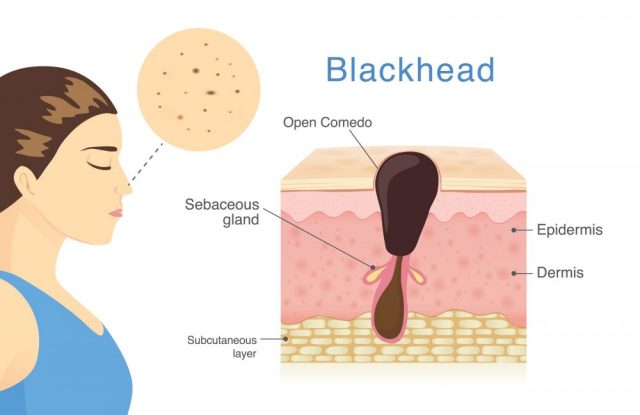Pimples On Nose: Types, Causes, Treatments, Herbal Remedies
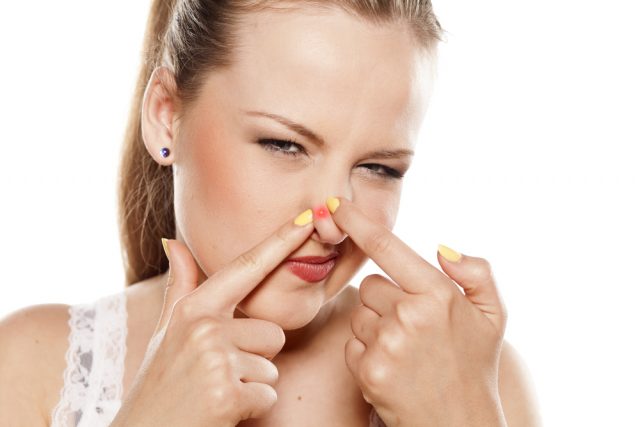 Women get occasional pimples here and there, especially before they get their periods. However, the nose is the most common target of acne and the most visible also. Luckily, you can prevent further breakouts by finding out the cause of the acne and effective prevention methods.
Women get occasional pimples here and there, especially before they get their periods. However, the nose is the most common target of acne and the most visible also. Luckily, you can prevent further breakouts by finding out the cause of the acne and effective prevention methods.
Why the nose?
Why is the nose a common site for pimples?
This is the question most women wonder, especially when the ‘bump’ occurs during the same days as an important event.
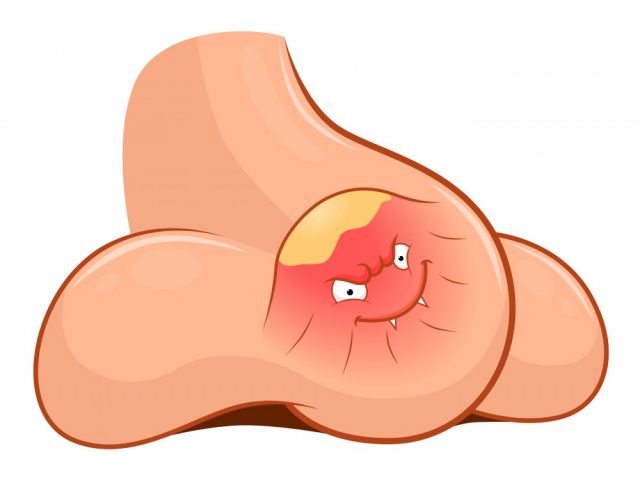 Yes, the nose is a common target for acne because the pores on this area are larger in size and tend to clog with environmental damage more easily – leading to a breakout. Besides being plain ugly, the pimples are painful and take longer to subside.
Yes, the nose is a common target for acne because the pores on this area are larger in size and tend to clog with environmental damage more easily – leading to a breakout. Besides being plain ugly, the pimples are painful and take longer to subside.
In desperation, many women try to scratch or prick the pimple in order to make it look less visible. However, the self-care technique usually makes the acne worse and can potentially leave a scar on the nose as well.
Acne vulgaris vs. Acne rosacea
There are many causes of nose acne and before you try to treat any type of acne, it is best to determine its underlying source.
Nose acne is divided into two types: the acne vulgaris and the acne rosacea. Both the conditions have similar symptoms but are different conditions and thus require distinctive treatment.
Acne vulgaris occurs when the pores on the skin become clogged with debris, such as dead skin and bacteria. They appear pus filled and are accompanied by black and white heads. Apart from the nose, the acne vulgaris can occur in other parts of the body as well.
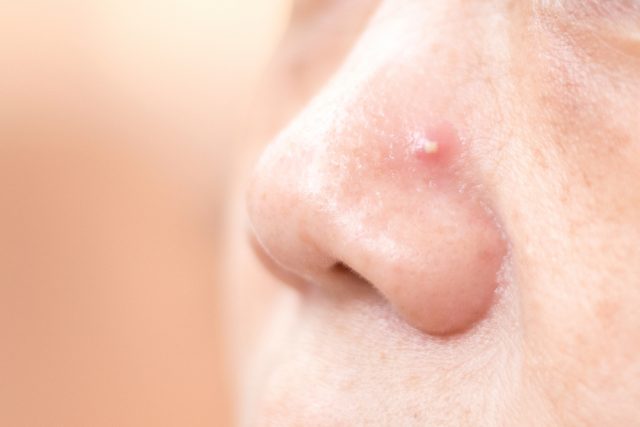 On the other hand, acne rosacea is a skin condition and not actually acne. Rosacea usually begins after the age of 30 and aggravates between 40 and 50. The skin condition causes redness and swelling, initially on the nose and spreads to other areas of the face. Acne-like bumps usually form on the red and inflamed area of the skin, illustrating a similar look as acne.
On the other hand, acne rosacea is a skin condition and not actually acne. Rosacea usually begins after the age of 30 and aggravates between 40 and 50. The skin condition causes redness and swelling, initially on the nose and spreads to other areas of the face. Acne-like bumps usually form on the red and inflamed area of the skin, illustrating a similar look as acne.
Causes of acne vulgaris
Generally,clogged pores and unhealthy skin-care habits cause acne vulgaris.
Some health conditions can also cause a breakout of acne including:
- Hormone fluctuations
- Digestive issues
- Increased stress
- Excessive sun exposure
- Removing hair from inside the nose
- Family history of acne
Causes of acne rosacea
Although acne rosacea is not actually a type of acne, it is often classified as the same due to the appearance of bumps.
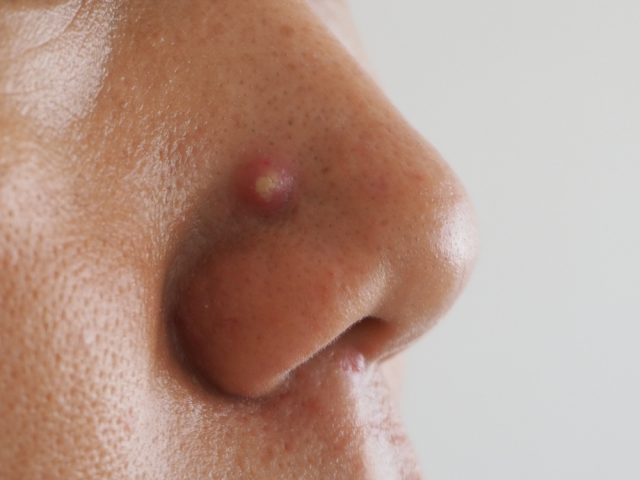 When it comes to the cause of acne rosacea, scientists are still unsure of the main reason behind the inflammation. However, the following are suspected to be the most important contributors of acne rosacea:
When it comes to the cause of acne rosacea, scientists are still unsure of the main reason behind the inflammation. However, the following are suspected to be the most important contributors of acne rosacea:
- Family history of the skin condition
- Fair or light skin color
- Abnormalities in facial blood vessels that causes excessive flushing and constant redness
- A condition called helicobacter pylori – a bacteria found in the gut and responsible for ulcers
- A reaction to mites that live on the skin
Some conditions can also trigger or aggravate rosacea. These include:
- Excessive exposure to sun
- Humidity
- Stress
- Anger
- Embarrassment
- Exercising
- Hot baths or sauna
- High blood pressure
Certain food and drinks can also trigger rosacea such as:
- Caffeine
- Hot foods and drinks
- Dairy products
- Dishes that are very spicy and contain excessive amount of hot sauce, chili sauce, and red pepper
- Alcohol
- Chocolates
- Tomatoes
- Citrus fruits
Acne vulgaris treatment
Acne vulgaris is classified into two groups – inflammatory acne or non-inflammatory. The non-inflammatory acne refers to the pimples, blackheads, and whiteheads that occur occasionally. Most of these are treated easily with over-the-counter topical creams and ointments, without leaving any scar.
On the other hand, we have the inflammatory acne. As the name implies, this is a severe form of acne vulgaris and comprises of swelling around the pimples. Antibiotic medications and ointments are often required to relive the acne, cysts, and swelling caused by the condition.
Conventional treatments for acne vulgaris
Here are some ways you can treat acne on the nose and other areas of the face:
- Cleansing: Cleansing soaps and creams are widely available that are specifically formulated to treat acne. They contain ingredients that helps break down the bacteria, remove excess oil from the surface, and reduce the appearance of acne.
- Benzoyl peroxide: Those who have mild acne can try applying benzoyl peroxide to the affected area. Available in various forms including creams, lotions, cleansers, and gels, the benzoyl peroxide helps clear out the bacteria that form acne. However, the application should be repeated continuously or the acne can recur.
- Salicylic acid: Another product that helps unclog pores and diminishes acne is salicylic acid. It removes excessive dead skin cells from around the pimples, preventing further breakouts. It is also included in many types of acne-removing creams, lotions, and gel.
- Topical retinol gels: The topical retinoid help prevents acne breakouts by unblocking the clogged pores. However, retinoid gels take longer to work and you can expect the acne to get worse before it starts to heal.
- Antibiotics: For severe forms of acne, dermatologists may prescribe antibiotics to lessen the pimples, acne, and inflammation. The oral antibiotics are more effective when taken in combination with benzoyl peroxide.
Herbal remedies for acne vulgaris
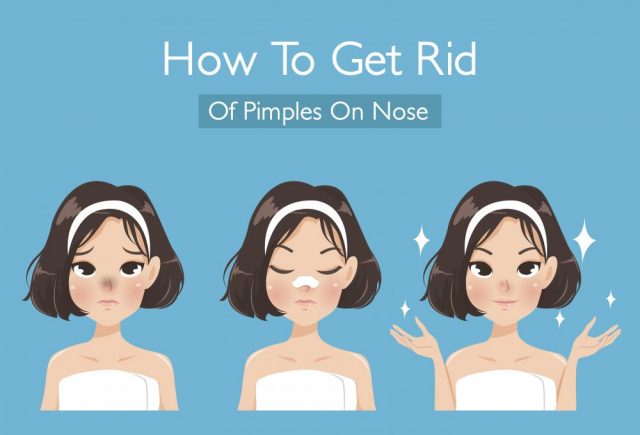 Besides medical treatment options, many acne-suffering individuals turn to herbal or home remedies for relief from acne on nose and other areas of their face. Interestingly, many of these home remedies are backed by science when it comes to their effectiveness to treat acne. These include:
Besides medical treatment options, many acne-suffering individuals turn to herbal or home remedies for relief from acne on nose and other areas of their face. Interestingly, many of these home remedies are backed by science when it comes to their effectiveness to treat acne. These include:
- Tea tree oil: Tea tree oil is a natural anti-bacterial and anti-inflammatory agent that can be helpful in reducing acne sores, swelling, and redness around the pimple. To use the tea tree oil, make sure you dilute it in carrier oil or add them to creams, gels, and ointments.
- Aloe Vera: Aloe Vera is another anti-bacterial and anti-inflammatory ingredient that prevents acne breakouts and reduces the appearance of existing ones. It also works as a moisturizer and is available in plant-form as well as part of creams, facewash, and ointments.
- Honey: Honey has been used as an effective remedy for several skin conditions for centuries including acne. It contains antioxidants that clear clogged pores and inflammation. Simply rub honey on the pimple site or add to your facemask.
- Coconut oil: The coconut oil can also be helpful in destroying acne-causing bacteria and redness associated with it. It can also enhance the healing process of open sores. Coconut oil can be applied directly to the affected area for fast relief.
- Green tea: Green tea is high in antioxidants and applying it directly on the acne-prone area can reduce the sebum production, inflammation, and formation of pimples.
Lifestyle changes for relief from acne vulgaris:
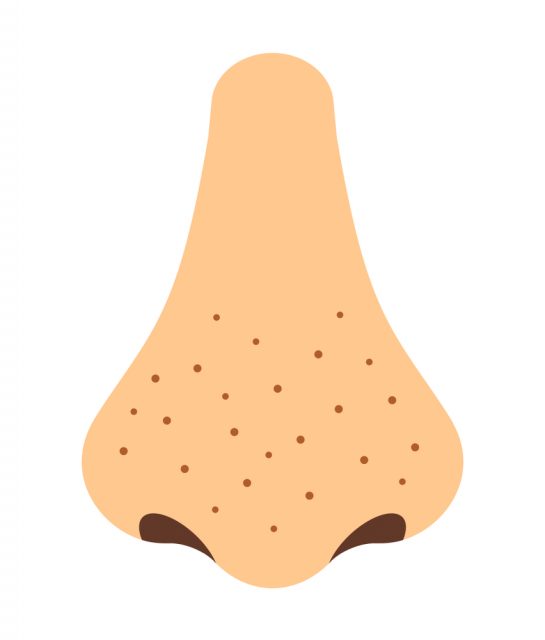 Along with herbal medications, specific lifestyle changes can also help keep the skin, specifically nose clean from acne breakouts. Some tips you can try to maintain healthy skin include:
Along with herbal medications, specific lifestyle changes can also help keep the skin, specifically nose clean from acne breakouts. Some tips you can try to maintain healthy skin include:
- Drinking lots of water
- Eating a balanced diet full of fresh fruits and vegetables
- Avoiding touching or fiddling with the pimples that appear on any area of the face
- Using oil-free skincare products
- Limiting alcohol intake
- Reducing stress
- Exercising regularly
- Getting adequate amount of sleep
Treatment for acne rosacea
Rosacea is a medical condition and usually requires medical attention. In fact, extensive research has proven that home remedies and over-the-counter are not as effective as prescription medications for the treatment of rosacea.
The doctors usually recommend brimonidine to reduce the inflammation caused by rosacea. Antibiotics are also prescribed for temporary relief from the pimples while metronidazole acid, azelaic acid and isotretinoin are also given for long-term use.
Doctors also recommend alternative therapies that include dermabrasion or microdermabrasion that helps remove the skin cells responsible for acne. Laser therapy is also effective in reducing the redness associated with the acne rosacea. However, it is not helpful in removing the acne from its source.
Inflammation caused by acne rosacea can also be reduced by practicing stress-relieving techniques in daily life such as meditation, yoga, and even massages.
Herbal treatments for acne rosacea
In addition to the advice by their doctor, many acne rosacea-suffering individuals apply home remedies for relief.
- Aloe Vera gel: The gel from the plant is a moisturizing and soothing agent. You can apply the gel extracted from a live aloe plant directly on the infected area or purchase aloe Vera induced moisturizers widelyavailable in the market.
- Chamomile:Chamomile is another moisturizing product that is applied topically to inflamed skin. Essential oils for chamomile are easily accessible but make sure to dilute them before applying directly on skin.
- Fever few: Fever few is another plant that is considered as an effective remedy for acne rosacea. It has antioxidant properties and works as a protectant against harmful UV exposure – that often triggers rosacea.
- Oatmeal: Oatmeal strengthens the skin and reduces water loss that aggravates the rosacea. It is also said to help with the itching caused by the skin condition. Although many creams and facemasks contain oatmeal, you can easily make your DIY-mask by mixing two tablespoons of oatmeal with water and applying directly on the skin.
- Turmeric: Turmeric is often recommended for severe forms of acne rosacea. The anti-inflammatory ingredient can be either mixed in water or diluted in carrier oil for application.
Lifestyle changes for relief from acne rosacea:
Additionally, the flare-ups of rosacea can be avoided by certain lifestyle changes and managing the triggers that cause the acne buildup. This includes:
- Avoiding stress and anxiety
- Wearing sunscreen regularly and avoiding excess-exposure to sun
- Eating foods with anti-inflammatory properties such as kale, avocados, and ginger
- Increasing intake of zinc
- Avoiding foods that trigger rosacea
Certain people can have both – acne vulgaris and acne rosacea at the same time. If the same problem remains with you, we recommend against self-care techniques to treat the problem. Instead, consult with your skin care doctor for the best treatment plan that targets both the conditions effectively and permanently.
Bottom line
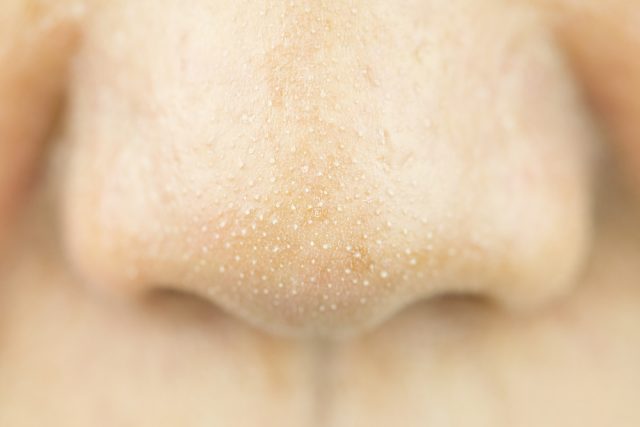 Nose acne is a nuisance and can cause both – discomfort and low self-esteem. However, regardless of the condition and its intensity, pimples on nose can be treated effectively with the right protocol. Try the above tips and ensure proper facial hygiene to protect your skin from future breakouts.
Nose acne is a nuisance and can cause both – discomfort and low self-esteem. However, regardless of the condition and its intensity, pimples on nose can be treated effectively with the right protocol. Try the above tips and ensure proper facial hygiene to protect your skin from future breakouts.

